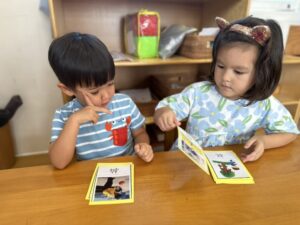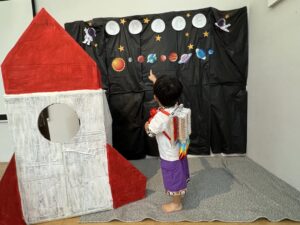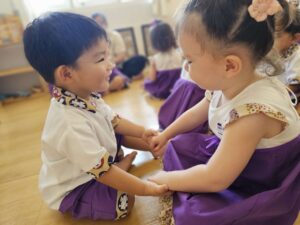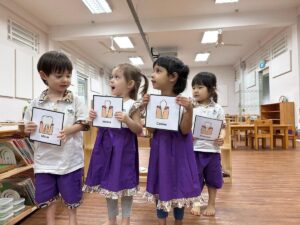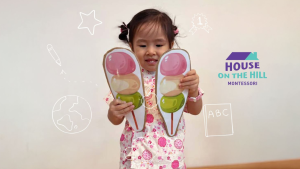Mandarin has been an essential aspect of the curriculum since House on the Hill was founded in 2012. Mandarin Chinese has more than 1.3 billion native speakers, making it the most common first language in the world. Children from birth to age 6 pass through various stages of what Dr. Maria Montessori called sensitive periods for language, making it all the more critical for us to be teaching different languages in early childhood.
One of the first Mandarin words a child may learn at House on the Hill is 老师or Lao Shi (teacher). Our Lao Shis develop close bonds with all the children and are integral to the community of care and teaching at HotH. Lao Shis are often the first smiling faces children see at the morning health check, they can be found chatting with them at the playground and during lunch, and of course, they create and teach the bespoke Mandarin curriculum that HotH is known for (amongst children and parents!).
We teach Mandarin with games, activities, and cultural experiences so that everything is both fun and educational. The children are more engaged and can experience the fun of learning Mandarin in a relaxed and happy atmosphere. The children learn to communicate freely and express themselves confidently in Mandarin through songs, dances, plays, poems and other activities.
The key highlights of our Mandarin programme are:

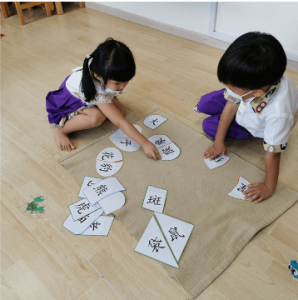
-
- 自主操作 – Lots of hands–on learning to keep lessons fun and engaging

-
- 户外 – In line with HotH’s Montessori philosophy, this includes taking lessons outside!
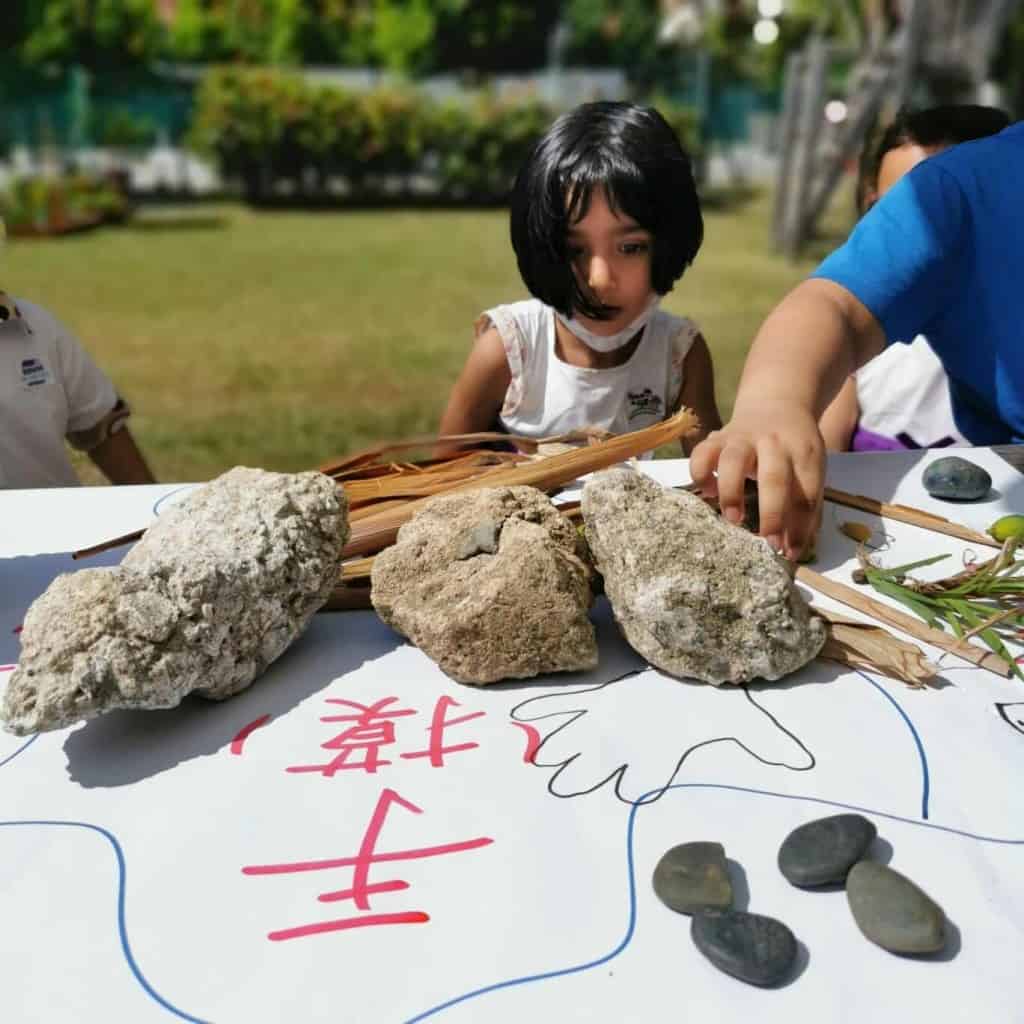
-
- 探索– There’s lots of exploration through different themes with the language

-
- 听– Listening in class with fun and interactive ways
-
- 说– Children are taught to communicate clearly and well
-
- 读– We use a variety of education tools such as flashcards and storybooks to teach reading
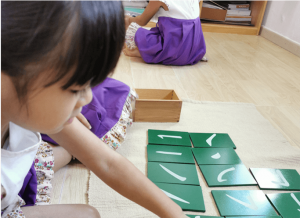
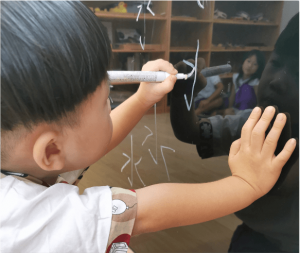
-
- 写 – To learn to write, we use tools such as sandpaper strokes and constant practice to impart this skill
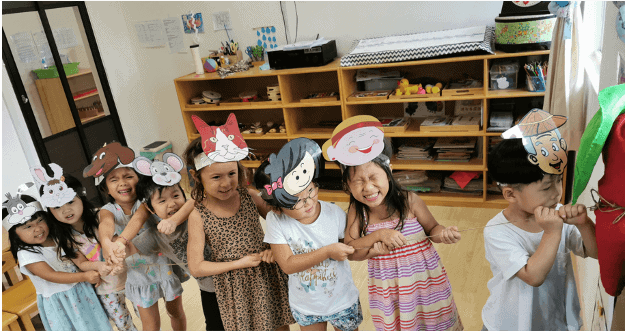

-
- 文化– Children are also exposed to drama, games, rhymes, chants, songs, music and movement to deepen their understanding of the elements of the Chinese language and culture.

-
- We use real life experiences to bring the language to life too
The duration of the daily lessons is based on the children’s age, development, and concentration levels. These activities and lessons planned are engaging and rich in content which allow children to learn effectively within a half an hour to 45mins time span. On top of that, the Lao Shis conduct small group teaching as an extension after lessons.
Hanyu Pinyin
For local children, we know that they need to understand and use Hanyu Pinyin effectively when they start Primary School. However, it is vital that the children must have a good grounding and preparation in Mandarin as well as phonics beforehand. This is to prevent confusion between the two. Our primary focus is on equipping them with the skills of listening, speaking, reading and writing. K2 students will get an introduction and exposure of basic Hanyu Pinyin from Term 3 or 4 onwards.
Teaching
Our Mandarin teachers across our schools are native speakers. We have in place stringent hiring process to ensure we maintain the quality standards of teaching in all our schools. Besides meeting the criteria of educational as well as early childhood qualifications, our teachers must also have the passion and the natural love for teaching and guiding the children in all areas of their development. We also conduct constant teacher training.
Some commonly-asked questions about our program are:
Are HotH children prepared for Primary 1 Mandarin curriculum?
We equip all our students with a really strong foundation in Mandarin so that when they transit to any primary school they are able to continue to expand their language skills as they get older.
However, we acknowledge that there is a certain pressure involved with transitioning to Primary 1 in the Singaporean education system. Each of our students has a customised learning journey and we work hand-in-hand with their parents to ensure that their academic goals are being achieved. For children moving to the local system, we are aware of the skill requirements for Primary 1 and we prepare each student accordingly.
Help! My child won’t speak Mandarin even though he understands it.
If you are a bilingual parent or come from a family that speaks multiple languages you know the frustration of speaking to your child in one language and having them respond in another. Children of a young age will often use any vocabulary they know to make themselves understood, and as they grow older they will tend to use the one that is dominant in their society. If you are trying to converse with your child more in Mandarin there are some things you can do to help encourage Mandarin responses and practice!
-
- Add additional Mandarin resources in your home like books, music or games.
- Be consistent. If you only use Mandarin when talking to your child and expect only Mandarin in response they will begin to speak more
- Create a need for them to speak it. Children know that you are bilingual, too! Find playdates or spend time with grandparents with whom your child can only communicate in Mandarin with.
- Sometimes they may not know the word and will substitute in the English word. Gently remind them of the word and ask them to repeat it before moving on with the conversation.
How can I help my child learn Mandarin if I don’t speak the language?
Research on bilingualism mostly all comes to the same conclusion: more exposure to a language increases the chances of full bilingualism. If you or your partner do not speak Mandarin the best thing you can do is increase your child’s exposure to the language. The key is to create a conducive and comfortable environment to learning Mandarin.
Parents are always the best teachers and role model for their children. One suggestion Lao Shi has is for parents to pick up a few simple Chinese conversational phrases or sentences. In this way, children will not be shy or embarrassed to express themselves in Mandarin in front of them. Parents can also find some simple short sentence audio books or picture books to help children practice at home. Try role-playing! For example, parents can pretend to be students and get the child to teach them Chinese words that they’ve already mastered in class to boost their confidence.
Here are some tips from Lao Shi:
-
- Play Mandarin language music at home
- Label some of the things around the house in Mandarin. Get the children involved and have them help with labelling
- Playdates are a great opportunity for children to learn language! Meet up with friends and neighbours who speak Mandarin, and as much as possible create situations where your child is relaxed and comfortable trying their Mandarin with new people.
What if the child is fluent and strong in their native language and you now want to encourage them in practicing Mandarin?
The most direct way is to spark that interest in the language for the child.
-
- Make use of every opportunity to speak Mandarin to your child
- If your child is allowed to have a short screen time, watch educational programmes or movies in Mandarin and then discuss what you saw together.
- Initiate a conversation with your child using Mandarin
- To widen their vocabulary, let your child look at more pictures or even encourage them to have some action games to move according to the word cards they read.
We will end this blog post with this beautiful rendition of 春晓 古诗 (Spring Poem) by our lovely students!

